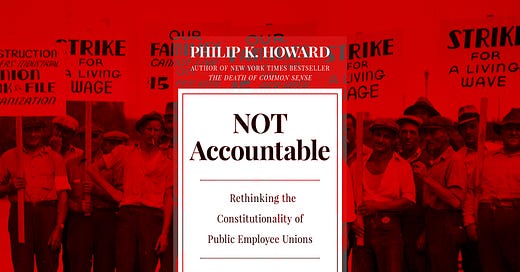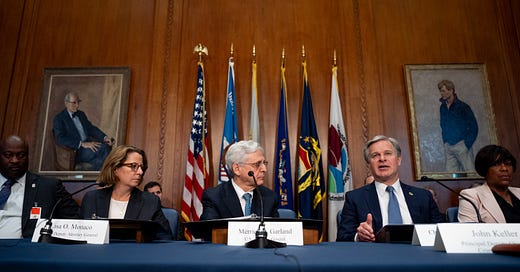A Constitutional Remedy for the Ills of Public-Sector Unions
Unions for police and teachers have long skirted accountability for their members—but the Supreme Court could change that.
[Attorney and writer Philip K. Howard joined Beg to Differ on March 24, 2023. In his new book, Not Accountable: Rethinking the Constitutionality of Public Employee Unions, he argues that public sector unions have undermined constitutional governance, and the remedy lies with the courts.]
Philip K. Howard: The reason I think [there’s] a constitutional solution . . . is that public employees have a fiduciary duty to the public sector, and to the common good. . . .
And what they've done here by collective bargaining is not what other interest groups do. Other interest groups . . . argue for special benefits of one sort or another, and you have debates over it, and they ask for their sliver of this or that from the public trough—a subsidy here or there.
[But] the public unions have harnessed the mass of big government against the reform of big government. They are different in degree, hugely, from all other interest groups. And they do it not to get a subsidy here or there: They do it to take control of the entire operating machinery of government so that democracy, I would argue, cannot work.
In the decade before George Floyd was killed, the Minneapolis Police Department had 2,600 complaints of abusive behavior by the police force. Twelve resulted in discipline, and the most harsh discipline was a 40-hour suspension. So you're talking about a system of government with near-zero accountability. And accountability is in fact the operating lever of democracy—it is a process of accountability. And those links have been broken. . . .
We are pursuing the constitutional arguments, and the Constitution will mean what the Supreme Court says it means, whether or not there's been [a] case before. . . .
I also think that what’s happened to governance in this country is a scandal. It should be a scandal that, you know, 23 schools in Baltimore have not one student proficient in reading—not one student. So, it's a scandal about the Minneapolis Police Department. It's a scandal that there’s no accountability.
So, I’m hoping that the book will in fact, also unleash some political debate, as Bill was saying, and that Damon was saying, that I think would be very constructive. And by the way, politics is not separate from court decisions entirely. So, it's against the backdrop of what citizens care about and want that courts make decisions.
Mona Charen: Right. And I think one contribution of your book is to highlight for readers a problem that they might have dimly perceived, but they didn't quite see how it all worked. They know it's very hard to get reform. They know you can't fire a teacher—there are rubber rooms. And they know you seemingly can't hold cops accountable for shooting unarmed people. But I don't think they recognize the role of unions and union rules.










